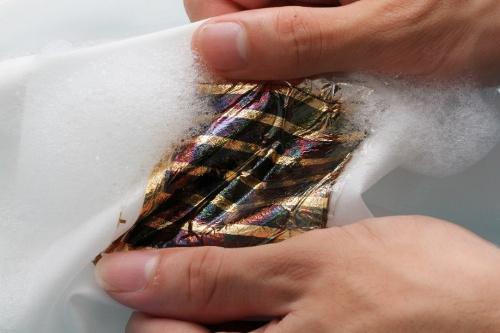New Waterproof Solar Cells Invigorate The Fashion Industry
Scientists in Japan have been working on solar cells to charge smart clothing and wearables, but struggled with durability. Now, by adding a waterproof film coating on the cells, they've been able to extend their life and improve efficiency.
Updated May 24 2019, 9:20 a.m. ET
Solar cell technology has improved to become thin and stretchable, and now it’s made another major breakthrough. Researchers from Japan have been able to coat ultra thin photovoltaic cells with waterproof film, meaning that it can be placed in water and still generate electricity from the sun. With this discovery, it could potentially place solar cells in our clothing.
Scientists from the University of Tokyo and RIKEN have been attempting to create a better way to charge wearable devices. Being able to monitor your health with a jacket or a pair of yoga pants aiding in a workout session can be beneficial, but it won’t help if the battery is dead. Solar cells right on clothes could be a viable solution, provided, of course, that they’d be able to survive the wear and tear of our daily lives.
In order to keep these cells durable and efficient, they used flexible, organic PV cells based from PNTz4T material in parylene film. It was then coated with an elastomer textile fiber on both sides to prevent any water and air from coming in, yet it’s still clear enough to pick up the sun’s rays. The result was stretchy clothing that was able to generate electricity.
Initial testing on the product was very positive, generating around 7.9 percent of efficiency. That’s significantly low compared to the standard solar PV technology where it has around 25 percent efficiency. News seems to come out frequently of scientists improving that efficiency over the summer, with some reports hitting around 50 percent.
Still, being able to convert any energy from the sun on clothing is remarkable. When testing out durability, it only suffered a slight drop in efficiency after being soaked in water for two hours. After being compressed and wet for 20 washing cycles, total efficiency dropped by 1.5 percent.
“We were very gratified to find that our device has great environmental stability while simultaneously having a good efficiency and mechanical robustness,” Kenjiro Fukuda, one of the RIKEN researchers, said in a company press release. “We very much hope that these washable, lightweight and stretchable organic photovoltaics will open a new avenue for use as a long-term power source system for wearable sensors and other devices.”
This technology wouldn’t be ideal for frequently washed items right now, but the potential is certainly there. These flexible solar cells would be a great complement to superconductors and kinetic energy being used to power wearables. As we’ve seen with solar PV cells, efficiency will only be improved upon.

